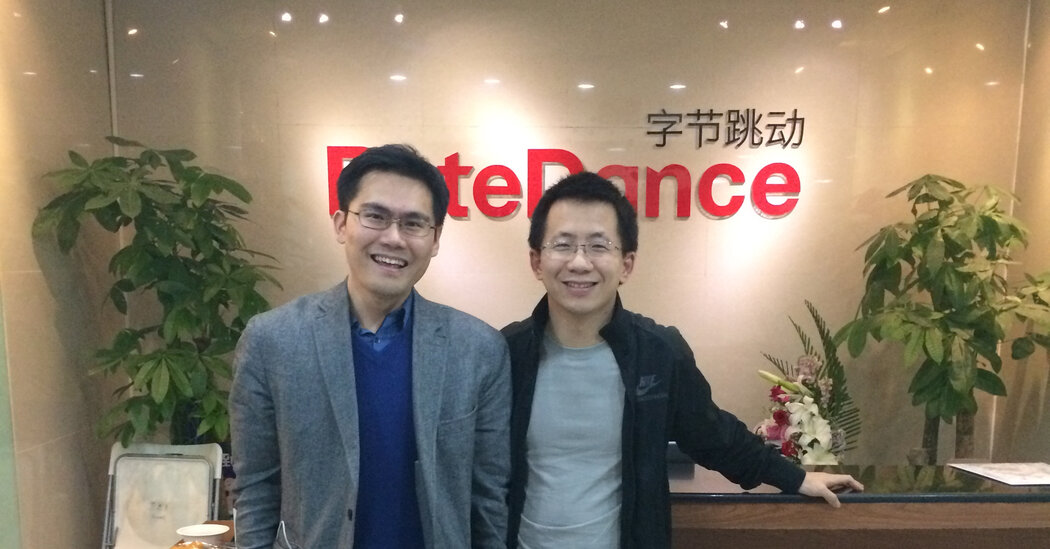A former executive of ByteDance, the Chinese company that owns TikTok, has accused the tech giant of a “culture of lawlessness,” which included stealing content from rival platforms Snapchat and Instagram in its early years, calling the company a “useful propaganda tool.” for the Chinese Communist Party.”
The claims were part of a wrongful dismissal lawsuit filed Friday by Yintao Yu, who served as chief of engineering for ByteDance’s US operations from August 2017 to November 2018. The complaint, filed in San Francisco Superior Court, says Mr Yu was fired because he raised concerns about a “global scheme” to steal and profit from other companies’ intellectual property.
One of the most notable allegations in Mr. Yu’s lawsuit is that ByteDance’s Beijing offices had a special unit of Chinese Communist Party members, known as the Committee, that monitored the company’s apps, “guided how the company promoted core communist values” and possessed a “death switch” that could completely disable the Chinese apps.
“The commission maintained supreme access to all company data, even data stored in the United States,” the complaint said.
Mr. Yu’s allegations, describing how ByteDance operated five years ago, are surfacing now that TikTok is under intense national scrutiny due to its relationship with its parent company and China’s possible influence over the platform. The video app, used by more than 150 million Americans, has become extremely popular for memes and entertainment. But lawmakers and US officials are concerned that the app is passing sensitive information about Americans to Beijing.
In March, a congressional committee questioned TikTok CEO Shou Chew about China’s ownership of the app. Christopher Wray, the director of the Federal Bureau of Investigation, recently said that TikTok is “crying out with national security concerns.” More than two dozen states have banned TikTok from government devices since November.
In an emailed statement Friday, ByteDance said the company would “strongly oppose what we believe to be baseless claims and allegations in this complaint.”
“Mr. Yu worked for ByteDance Inc. for less than a year and his employment ended in July 2018. During his short time with the company, he worked on an app called Flipagram, which was discontinued years ago for business reasons,” the statement said.
In his complaint, 36-year-old Mr Yu said that while TikTok was trying to attract users in its early days, ByteDance engineers were copying videos and posts from Snapchat and Instagram without permission and then posting them to the app. He also claimed that ByteDance “systematically created fabricated users” — essentially an army of bots — to increase engagements, a practice Mr Yu said he reported to his superiors.
Mr. Yu says he raised these concerns with Zhu Wenjia, who was in charge of the TikTok algorithm, but that Mr. Zhu was “dismissive”, noting that it was “no problem”.
Mr Yu, who spent part of his ByteDance tenure working in its Chinese offices, said he also witnessed engineers for Douyin, the Chinese version of TikTok, tweaking the algorithm to elevate content that expressed hatred for Japan. In an interview, he said that the promotion of anti-Japanese sentiment, which would make it more prominent for users, was done without hesitation.
“There was no debate,” he said. “They just did it.”
The lawsuit also accused ByteDance engineers working on Chinese apps of downgrading content that showed support for pro-democracy protests in Hong Kong while more prominently criticizing the protests.
As an example of what was described as the “lawlessness” within the company, the lawsuit says ByteDance founder Zhang Yiming facilitated bribes to Lu Wei, a senior government official in charge of internet regulation. Chinese media at the time reported on the trial of Lu Wei, who was charged in 2018 and subsequently convicted of bribery, but did not mention who paid the bribe.
TikTok has tried to convince lawmakers that it operates an arm’s length from ByteDance and that the Chinese government has no influence or special access to the app. It has been working on a costly plan to store US user data on Oracle servers in the United States known as Project Texas.
Mr. Yu, who was born and raised in China and now lives in San Francisco, said in the interview that US user data was stored on TikTok in the United States during his time at the company. But engineers in China had access to it, he said.
The geographic location of servers is “irrelevant,” he said, because technicians could be a continent away and still have access. During his tenure at the company, he said, certain engineers had “backdoor” access to user data.
His lawsuit is seeking lost earnings, damages, and 220,000 shares of ByteDance that had not yet been acquired by the time he was fired. The complaint does not list a specific amount of damages, but the shares alone are said to be worth tens of millions of dollars. The case was filed after years of mediation with the company failed.
Mr. Yu is represented by Charles Jung, a San Francisco attorney specializing in employment litigation.

